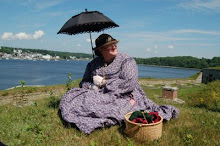The first Christmas tree in America was erected in Cleveland, Ohio in 1851, so most likely you would have had at least one prior to the war. Most decorations would have been made at home and were very simple, such as dried and sugared nuts and fruits, popcorn balls and string. Colored paper, wax ribbon, spun glass, and silver foil ornaments were also popular. Ornaments were made in the shape of doll faces, angels, the Christ Child, and animals. Most trees sat on the table top. Unwrapped presents would be placed under them. Without a doubt, the Christmas tree was the centerpiece of the home. The entire house would have been decorated with greenery such as fir, pine, holly, ivy, and mistletoe.
Songs such as "Silent Night," "Oh Come All Ye Faithful," "Hark the Herald Angels Sing," and "Deck the Halls" were popular. "It Came Upon a Midnight Clear" was written in 1850, and other songs such as "O Little Town of Bethlehem," "Away in a Manger," "I Heard the Bells on Christmas Day," and "Up on the Housetop" soon followed.
The Christmas Card started in 1844 and must have been dearly prized during the war!
Tally Simpson a member of the 3rd South Carolina Volunteer wrote his sister from Fredericksburg trenches.
From: Tally Simpson, Camp near Fredricksburg
To: Anna Simpson
Camp near Fred'burg
Dec 25th, 1862
My dear Sister
This is Christmas Day. The sun shines feebly through a thin cloud, the air is mild and pleasant, [and] a gentle breeze is making music through the leaves of the lofty pines that stand near our bivouac. All is quiet and still, and that very stillness recalls some sad and painful thoughts.
This day, one year ago, how many thousand families, gay and joyous, celebrating Merry Christmas, drinking health to absent members of their family, and sending upon the wings of love and affection long, deep, and sincere wishes for their safe return to the loving ones at home, but today are clad in the deepest mourning in memory to some lost and loved member of their circle. If all the dead (those killed since the war began) could be heaped in one pile and all the wounded be gathered together in one group, the pale faces of the dead and the graons of the wounded would send such a thrill of horror through the hearts of the originators of this war that their very souls would rack with such pain that they would prefer being dead and in torment than to stand before God with such terrible crimes blackening their characters. Add to this the cries and wailings of the mourners - mothers and fathers weeping for their sons, sisters for their brothers, wives for their husbands, and daughters for their fathers - [and] how deep would be the convictions of their consciences.Yet they do not seem to think of the affliction and distress they are scattering broadcast over the land. When will this war end? Will another Christmas roll around and find us all wintering in camp? Oh! That peace may soon be restored to our young but dearly beloved country and that we may all meet again in happiness.
But enough of these sad thoughts. We went on picket in town a few days ago. The pickets of both armies occupy the same positions now as they did before the battle. Our regt was quartered in the market place while the others occupied stores and private houses. I have often read of sacked and pillaged towns in ancient history, but never, till I saw Fredricksburg, did I fully realize what one was. The houses, especially those on the river, are riddled with shell and ball. The stores have been broken open and deprived of every thing that was worth a shilling. Account books and nots and letters and papers both private and public were taken from their proper places and scattered over the streets and trampled under feet. Private property was ruined. Their soldiers would sleep in the mansions of the wealthy and use the articles and food in the house at their pleasure. Several houses were destroyed by fire. Such a wreck and ruin I never wish to see again.
Yet notwithstanding all this, the few citizens who are now in town seem to be cheerful and perfectly resigned. Such true patriots are seldom found. This will ever be a noted place in history.
While we were there, Brig Genl Patrick, U.S.A., with several of his aides-de-camp, came over under flag of truce. Papers were exchanged, and several of our men bought pipes, gloves, &c from the privates who rowed the boat across. They had plenty of liquor and laughed, drank, and conversed with our men as if they had been friends from boyhood.
There is nothing new going on. I am almost dead to hear from home. I have received no letters in nearly three weeks, and you can imagine how anxious I am. The mails are very irregular. I hope to get a letter soon. Dunlap Griffin is dead, died in Richmond of wounds received in the last battle. Capt Hance is doing very well. Frank Fleming is in bad condition. (He has been elected lieutenant since he left.)
Write to me quick right off. I wish to hear from you badly. Remember me to my friends and relatives, especially the Pickens and Ligons. Hoping to hear from you soon I remain
Your budTally
Happy Holidays to all my friends!

No comments:
Post a Comment